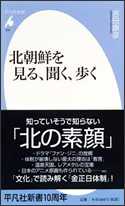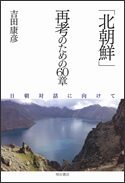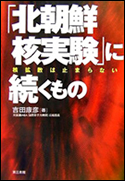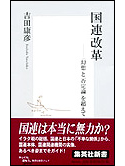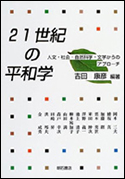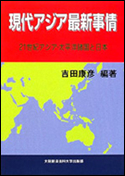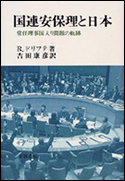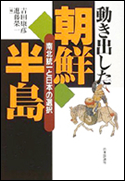2005年5月01日
【6】Report on a Fact-Finding Tour of the DPRK (May 2005)
Welcome Dinner marked by Accusation of George Bush
Upon the invitation of the DPRK's Association of External Cultural Exchanges, I made a week-long stay in Pyongyang, Kaesong, Shin-uiju and elsewhere in North Korea from 30 April to 8 May 2005. It was my seventh visit since 1994.
The Association is a non-governmental agency dealing with countries with which North Korea has no diplomatic relations, such as Japan and the United States. I led a four-member goodwill mission of Japanese scholars and opinion leaders. The three others were Prof. MAEDA Yasuhiro (Otsuma Women's University), Prof. YONEDA Shinji (Tezukayama-gakuin University) and Prof. NAKATO Sachio (Utsunomya University).
Arriving at Pyongyang's Sun-an Airport on the evening of 30 April via Shen-yang, Northeast China, we were welcomed by Hwang Ho Nam, the Association's Director in charge of Relations with Japan, and other senior officials. Accommodated at the Yagando International Hotel on a small mid-island off the Daedong River, we were guests of dinner hosted by the Association's Vice President, Ms. Hon Song Ok.
During her welcoming speech, Ms. Hon accused the Japanese Government of following the Bush Administration's anti-DPRK policy. She declared that the American hostile policy toward North Korea remains unchanged, no matter which administration is in power in Washington, Democratic or Republican. "We are determined," she said, "to fight until Washington finally changes its policy and withdraws from the Korean Peninsula." "Despite Prime Minister KOIZUMI Jun-ichiro's visit to Pyongyang in September 2002 and in May 2004," she said, "Japan has failed to implement the Joint Pyongyang Declaration-the landmark for
the normalization of Japan-DPRK relations, under political pressure from the Bush Administration, which, she said, has not given up a plot to topple our government.".
2005 May Day Celebrations/ Gay and Cheerful Atmosphere
Citizens of Pyongyang were celebrating May Day on 1st May, when we were taken outside to parks, football stadiums, riverside banks and other public places. A gay and cheerful atmosphere characterized the entire city under a bright sunshine.
Military parades, spearheaded by missiles and tanks,---a one-time symbol of May Day celebrations in many Socialist countries-have no longer been staged anywhere in post-Cold War days. Pyongyang's May Day was no exception.
One typical outdoor performance was a game of blindfolded Koreans with a wooden sword in their hand running on a course where a wood-made model U.S. soldier was standing. Those who successfully hit and knocked down the enemy target were awarded gifts and prizes.
Apparently, the game symbolizing tense U.S.-DPRK relations was one of the most popular events in Pyongyang.
People, men and women, accompanied by their children, looked happy and satisfied with outdoor barbecue lunch with wild duck meat over a glass of local beer.
One of the Korean family groups surrounding the barbecue fire on the riverside, invited us to join them to share a glass of local liquor. The middle-aged man, who introduced himself to be a junior high school teacher in Pyongyang, said, "Welcome, comrades from Japan. We are neighbors, aren't we?"
Obviously, he was aware of the absence of diplomatic relations between Japan and the DPRK. He said, "We can be friends as long as we have goodwill. Our common enemy is George Bush."
He gave a model answer to our questions.
Pyongyang more lively than before
The city of Pyongyang gave the impression that judging from their dress and complexion, citizens were enjoying a better living standard than before. There were a greater number of passenger cars, especially the Hwipalam ( meaning a whistle in Korean)-a home-made car modeled from Italy's Fiat, assembled in the Nampo industrial complex run with South Korea's private investment.
The inhabitants of Pyongyang are indeed the "elite"-selected people belonging to the upper classes; most of them are senior Workers' Party officials, their families and relatives as well as the incumbent and retired military officers, their families and relatives. The nouveau riche apparently increased in number. Foreigners also seemed to be increasing.
During the first week of May, the hotel where we were staying was almost packed to capacity with foreign tourists and businessmen, mostly from China and South Korea. There were also those from Singapore, Malaysia, Thailand and Hong Kong, as well as from Canada, Australia and Western Europe. The DPRK is not isolated so much as reports from Washington often emphasize.
During the first week of May, the hotel where we were staying was almost packed to capacity with foreign tourists and businessmen, mostly from China and South Korea. There were also those from Singapore, Malaysia, Thailand and Hong Kong, as well as from Canada, Australia and Western Europe. The DPRK is not isolated so much as reports from Washington often emphasize.
During our stay, we visited the so-called General Market on the Reunification Avenue ---a free market based on a market mechanism, where some 1,500 stalls were displaying all kinds of consumer goods, from food and cloth to electric products, such as TV sets, refrigerators, cleaners and other home appliances. Most modern and industrial goods were imports from China, while fruits, vegetables and other agricultural products were mostly brought from the countryside. The overall impression was that Pyongyang was a local town in the northeast of China.
The DPRK Government has approved a total of 50 such open markets throughout the country, all of which our guides said are quite popular and successful. The measure is classified as one of the country's gradual attempts to introduce an open economy in its own style, which is basically the same as in China.
At the entrance of Pyongyang's market, there were the government's regulations saying; "You can bring and sell here anything but weapons, machine installations, drugs, printed materials, electronic communication tools such as mobile phones, counterfeit and smuggled goods, and products of assistance from international organizations."
The mobile phone has been banned in the whole of North Korea since April 2004, except for foreigners, after having been introduced and becoming popular rapidly. The DPRK authorities were certainly cautioned against information of an anti-government nature being spread easily among the public. In the border area near China, mobile phones based on Chinese communication facilities are reportedly used illegally by anti-government agents attempting to topple the Kim Jong Il regime.
Denuclearization of Korean Peninsula as Ultimate Goal
Substantial discussions on nuclear and other international issues were held with Dr. Park Hyong Jae, Deputy Director of the Foreign Ministry's Peace and Disarmament Institute. The main points clarified by Dr. Park are as follows:
(1) The DPRK's ultimate goal is total denuclearization of the Korean Peninsula and reunification of the two divided States by peaceful means.
(2) It should be noted that the 1950--53 Korean War is still in the stage of armistice. Conclusion of a peace treaty between the two warring parties, the DPRK and the United States, is indispensable.
(3) Nuclear and all other issues ---sources of tension on the Peninsula arise from the hostile U.S. policy toward North Korea, under which the Bush Administration has been attempting to overthrow the DPRK Government.
(4) In his State of the Union message in January 2005, President Bush said a main policy goal of the second term of his presidency is to put an end to "tyranny" by propagating liberty, freedom and democracy throughout the world. Secretary of State Condrezza Rice, in her testimony in the Senate, said that North Korea is an outpost of tyranny, as well as Belarus, Cuba, Iran, Myanmar and Zimbabwe. There should be no peace on the Korean Peninsula as long as the Bush Administration sticks to such a hostile attitude toward North Korea.
(5) With no prospect on an imminent change in the U.S. policy, we decided to strengthen our self-defense by manufacturing nuclear weapons and increasing our nuclear arsenal. Iraq's Saddam Hussein regime was toppled easily by the U.S. forces, because Iraq did not possess nuclear deterrence. In fact, the Bush Administration has deployed to South Korea Stealth fighter-bombers and Aegis destroyers in 2004.
(6) We are ready anytime to return to the six-party talks in Beijing, on condition that the Bush Administration respects and honors the DPRK as an equal counterpart. President Bush should retract his pejorative remarks calling our great leader a "dictator" and dangerous person." [This materialized in June 2005, when he politely called "Mr. Kim Jong Il" in proposing the resumption of the six-party talks. And in fact, the fourth round of the six-party talks opened in Beijing on 27 July 2005.]
(7) The six-party talks should be a forum for comprehensive disarmament on the Korean Peninsula, since North Korea is now a nuclear-weapon state.
(8) Our nuclear armament is exclusively for self-defense. We have no uranium-enrichment program at all. This is a story fabricated by James Kelly, who claimed North Korea had admitted it during his visit to Pyongyang in October 2002. Our nuclear weapons are made of plutonium. It is true that plutonium-made bombs need an implosion test. You will see when we conduct a test.
(9) The possibility of a peaceful reunification of the two Korean States depends on the determination of President Roh Moo Hyun's Government in Seoul, whose north-south co-operation policy has been hampered by Washington. The Bush Administration is eager to create sources of military threat on the Korean Peninsula, thus preventing Seoul from finding investment opportunities in the North.
(10) Our ultimate goal, in other words, is to remove the Cold War residue from the Korean Peninsula and achieve a peaceful reunification of the Korean people by themselves. This remains unchanged for the past 15 years. We are prepared to negotiate with whichever administration in Washington, Democratic or Republican, for the normalization of diplomatic relations. We are determined to endure until Washington finally changes its policy of hostility.
Japan-DPRK Relations Totally Deadlocked
Bilateral relations between Japan and North Korea were dealt with by Mr. Son Il Ho, Deputy Director of the Foreign Ministry's Asia-Oceania Bureau.
Mr. Son, whom I had met twice before, looked strongly frustrated and disgruntled with the disruption of all official communication channels between Tokyo and Pyongyang, since the rupture of the business level talks over the abduction issue in November 2004.
During the week-long talks, Mr. Son emphasized, the DPRK side had presented all documents and materials evidential of the deaths of the eight Japanese abductees, whom North Korea has announced dead by car accidents, acute diseases, or poisoning. The Japanese Government had designated a total 15 Japanese nationals as abducted by North Korean intelligence agents mostly during the 1970s as potential Japanese-language teachers for agent training and other purposes.
After negotiations by stealth for more than a year, North Korea finally reversed its long-time denial of any abduction case and admitted that five were alive, eight dead, and two others with no record of entry. Five, the rest, have returned home. However, the Japanese side, especially families of the dead and missing, disclaiming North Korea's announcements, insists upon recapture of all abductees as alive.
Against this background, Mr. Son argued that Mr. YABUNAKA Mitoji, head of the Japanese delegation who attended the business-level talks, had thanked him for North Korea's "sincerity and efforts" in clarifying the abduction issue. According to Mr.Son, Mr.YABUNAKA had said, "90 percent of the whole abduction issue has now been clarified."
Upon his return to Tokyo, Mr. YABUNAKA changed his attitude, acquiescing the Japanese public opinion overwhelmingly denouncing North Korea for accumulating new lies upon old lies.
Mr. Son concluded by saying that the abduction case has been exploited by a group of Japanese right-wingers who adamantly oppose normalization of diplomatic relations between Japan and the DPRK and who instead insist upon economic sanctions to be applied to Pyongyang. Any economic sanctions, Mr. Son warned, are tantamount to declaration of war.
Lyongchon Locomotive Blast Accident Site Rehabilitated
A main purpose of our visit to the DPRK this time, was to present medicines to needy people as part of our humanitarian assistance, as I have been leading a small NGO, the Association of Humanitarian Assistance to North Korea (AHANK) since 1998.
We transported with us four big corrugated cartons of antibiotics, vitamin pills, anti-diarrhea tablets and other medicines worth one-million yen (9,000 US dollars) in total. I have so far donated such medical supplies three times for the past seven years.
Aboard two small Japanese Nissan passenger cars, we traveled to Lyongchon, 150 miles north of Pyongyang. It took us nearly five hours, as we had to fix a puncture twice in one of the two cars on the unpaved bumpy road between Myan Hyan Sam and Lyongchon. This indicates the nation's transportation network remains undeveloped so much that investment on public works is badly needed to ensure economic growth and recovery on the national level.
Lyongchon is the site where a coach of a full load of liquid nitric acid exploded due to technical mismanagement on 22 April 2004, according to official announcements. Speculation, however, was that this might have been an abortive attempt to assassinate Mr. Kim Jong Il.
The explosion claimed 161 lives and left 3,000 injured. A local primary school building and a local town hall, as well as several blocks of apartments, were totally destroyed by the blast.
After an elapse of one year, there were no scars of the accident.
A new green-color primary school building had been rebuilt; modern and colorful apartments rehabilitated; and a new white-color hospital was being constructed with financial assistance of 370,000 Euro from ADRA, a Swiss NGO.
We stayed overnight at the Amrokkang Hotel, located on the riverside in Sin-uiju on the China-Korea border. The hotel was crowded with noisy Chinese merchants and businessmen. The food served was Chinese, too. We stayed inside the DPRK all along, but our cars were ordered to stop several times at checkpoints on the entrance of the border town, due to strict traffic controls.
Prof. YONEDA, one of our members and the first in his visit to North Korea, sneaked out of his hotel room early in the morning, just to take fresh air outside from curiosity. He was being tailed by a "watcher", and brought back to the hotel immediately afterward. He was told, "You are being protected from unpredictable mishaps." I refrained from trying to enjoy even such a brief instant of freedom, as I had had similar experiences in the past. No matter where we went, we were "protected" by a couple of efficient guides, interpreters and "watchers" concurrently.
Visit to the DMZ at Pan Mun Jon and the Kae Son Industrial Complex
One people speaking the same language and sharing the same culture and other ethnic characteristics has been divided north and south, forming two rival states at one time fighting each other and killing millions of countrymen as victims of the Russo-American ideological confrontation.
The Korean War (1950--53), still in the state of armistice as aforementioned, retains traces of belligerency in the demilitarized zone (DMZ) along N.L. 38 degrees, two kilometers wide from the Military Demarcation Line (MDL), each in the north and south.
The DMZ is a no man's land for more than a half century, serving as a paradise for wildlife of all species. Don Oberdorfer, an American scholar and author of the Two Koreas, begins by writing that ornithologists have recorded 150 species of cranes, buntings, shrikes, swans, geese, kittiwakes, goosanders, eagles, and other birds passing through or living in the verdant strip each year, joining other year-round residents such as pheasant, wildpigs, black bears, and small Korean deer.
Atmosphere is in a sharp contrast in the north and south, however.
Contrary to anticipation, one would be surprised to witness how free and easy it is in the northern part of the DMZ
Those who visit the DMZ from Pyongyang are much smaller in number than those who come from Seoul. Millions of foreign and national tourists make a half-day or one-day sightseeing of the DMZ on South Korea's side, only 50 miles north of Seoul. They are told not to point or laugh at North Korean military guards "who, quickly provoked, could shoot you."
Therefore, visitors would feel tense and strained when they arrive at the demarcation line.
On the contrary, there is no tension in the north. Whenever I visit the DMZ from the north, I don't feel strained at all, as military officers guiding us are soft, cheerful and friendly in their manner and explanations. This is one of the simple examples to show how tension is created artificially and easily by political propaganda and exaggeration.
On our return, we visited the Kaesong Industrial Complex -a new joint venture with South Korea. The complex, located just 5.5 miles north of Panmunjom, is a by-product of the 2000 North-South Summit between President Kim Dae Jong and General Secretary Kim Jong Il, with the South offering capital, equipment and sales network and with the North supplying the labor and 6,600 hectares of land. Stainless pans for kitchen manufactured by local North Korean workers, made a debut in December 2004, as one of the most popular items selling "like hot cakes" in Seoul and elsewhere in the South.
A North Korean official argued that favored by low labor costs and high quality of workers, such a North-South joint venture has tremendous business opportunities in the overseas market, but that the Bush Administration resorts to every means to discourage the Seoul Government from expanding investments.
Despite the alleged American attempt, our impression was that cooperation between the North and South is now irreversible. A growing number of South Korean people tend to share affinity and solidarity with the North Koreans as a same nation in ethnicity. A recent public opinion poll shows that two thirds of South Koreans feel familiar with their neighbors in the North, whom more than 80 percent of South Koreans regard as the target of help and assistance.
During 2004, a total of 26-thousand South Koreans visited the North on business and/or humanitarian assistance, in addition to 260-thousand tourists from the South. The North-South trade amounted 700-thousand US dollars in 2004, nearly twice that of 2000. Humanitarian aid from the South was valued at a total of 260-thousand dollars in 2004.
South Korea now enjoys a gross domestic product worth 60-billion US dollars, with its individual annual income worth 13,000 dollars, roughly 40 times larger than that of North Korea. Most South Koreans believe they can afford to help their poor countrymen in the north, while respecting their pride and honor.
I referred to the impression that China may be regarding North Korea as part of its northeastern region, since many Chinese are doing business for mutual profit. It goes without saying that there are an estimated two-million Korean residents along the border area in Northeastern China.
Collapse of the DPRK Government and any sources of chaos and confusion are most unwelcome for both neighbors, who would therefore be determined to sustain the Kim Jong Il regime by whatever means. Surgical attacks by U.S. Forces on nuclear facilities and/or military targets, therefore, would be out of question.
The Word Food Programme in Action
On the last day of our stay, we visited the Representative Office of the World Food Programme (WFP) in Pyongyang, where we were received by Mr. Abraham de Koch, Deputy Country Director.
He briefed us about the food situation in North Korea, which he said has been steadily improving, though there still is a shortage of 1,000,000 tons of staple food on an annual basis. For a couple of years after the century's worst natural disaster in 1995, he said, the food shortage reached a two-million-ton level.
Two main supplier countries are China and South Korea, which have covered about a half of the shortage by a direct deal. The rest, Mr. de Koch said, comes from the United States, the European Union (EU), and various other countries in an international aid through the WFP. South Korea alone provided 400,000 tons in 2004 and 2005, while even the Bush Administration did 50,000 tons each last year. Japan, on the other hand, has suspended all aid commitments since May 2004 because of the unsettled abduction case.
According to the WFP, there are 42 international staff members who have been monitoring food distribution processes in 159 out of 203 counties of North Korea. This covers 86 percent of the whole nation in terms of population. The rest, Mr. de Koch said, is the area where the DPRK Government bans access for national security reasons.
Mr. de Koch emphasized that the economic reform measures, introduced in July 2002 in anticipation of massive economic assistance from Japan, have resulted in a hyper-inflation, further widening the existing gap between the rich and poor, and between the citizens living in the urban areas and those in the countryside. Nearly 40 percent of the nation's children, especially in rural districts, suffer from malnutrition, he added.
Pregnant women are also seriously affected. About one third of the mothers of children under the age of two have been found malnourished and anaemic resulting from a diet deficient in iron.
Humanitarian assistance in food and medicine is urgently needed, Mr.de Koch said.
At present, 12 international organizations, such as the WFP and the United Nations Development Programme (UNDP), the United Nations Children's Fund (UNICEF), the Food and Agriculture Organizations (FAO) and the World Health Organization (WHO) are represented in Pyongyang, while there are long-term resident representatives of 10 international non-governmental organization (NGO), such as ADRA, Charitas-Hong Kong, Christian Aid, and Save the Children.
Departure from Pyongyang and Conclusion
On the morning of 8 May, the whole city of Pyongyang under a sunny sky was full of young people mobilized to start practicing the mass game of "Arrirang" --a national festival scheduled to be staged for two months from 15 August to attract foreign tourists to mark the 60th anniversary of the nation's liberation from Japan's colonial rule.
During the previous festival in from May to August 2002, en estimated 60,000 overseas tourists, including Koreans from abroad, visited North Korea, bringing more than 100-million dollars as foreign currency income. The DPRK authorities obviously expect the same this year. This clearly indicates the DPRK, absolutely in need of peace and stability, seeks a diplomatic and peaceful solution to the nuclear crisis.
Program
| 30 April | Departure from Tokyo’s Haneda Airport/ Arrival at Pyongyang/ Unofficial welcome dinner hosted by Hwan Ho Nam, representing DPRK’s Association of External Culture Liaison and Exchanges |
| 1 May | Tour of City of Pyongyang、viewing May Day celebrations/ Official welcome dinner hosted by Ms. Hon Son Ok, Vice President |
| 2 May | Courtesy call on Kim Yong Il, Vice Foreign Minister/ Visit to Pyongyang Foreign Studies University/ Talks with Son Il Ho, Foreign Ministry Deputy Director/ Dinner with Son Il Ho |
| 3 May | Talks with Park Hyon Jae, Deputy Director, Foreign Ministry’s Peace and Disarmament Institute/ Travel to Lyongchon |
| 4 May | Visit to Lyongchon explosion site/ Donation of medicines/ Visit to Taeguang Common Farm outside Pyongyang |
| 5 May | Visit to DMZ and Kaesong Industrial Complex |
| 6 May | Visit to Pyongyang’s Free Market/ Visit to Chang GyonPrimary School |
| 7 May | Visit to WFP Office/ Briefing by AbrahamKoch, Deputy Director |
| 8 May | Departure from Pyongyang/ Return to Kansai InternationalAirport |
Members:
*YOSHIDA Yasuhiko, Professor, Osaka University of Economics and Law, Representative of the Association for Humanitarian Assistance to North Korea (AHANK)
*MAEDA Yasuhiro, Professor, Otsuma Women’s University
*YONEDA Shinji, Professor, Tezukayama-gakuin University; President of the Society of Education for International Understanding
*NAKATO Sachio, Associate Professor, Utsunomiya University


